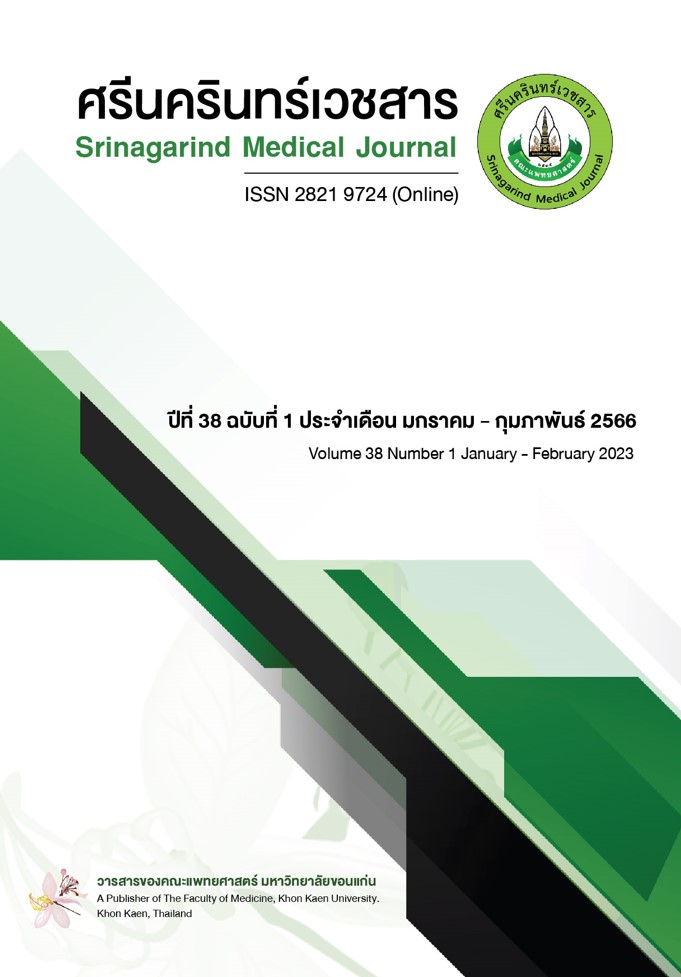Factors Related to Antiepileptic Drug Adherence in Post-Neurosurgeries Patients
Keywords:
adherence, antiepileptic drug, side effect, self-management, illness perception, depressionAbstract
Background and Objective: Convulsion was frequently reported in patients after neurosurgeries. Taking antiepileptic drug among the patients lasted for a while. Medication adherence was the extent to which a patient's behavior taking medication corresponds with the agreed recommendations from a healthcare provider. Therefore, it was significant to study factors affecting adherence of antiepileptic drugs. This study aimed to investigate factors relating to adherence of epileptic drugs among patients post neurosurgeries.
Materials and Methods: The samples consisted of 110 post neurosurgeries patients; aged between 18-59 years. both male and female attending at Surgical Outpatient Department. The research instruments consisted of the demographic questionnaire, the illness perception questionnaire, the self-management questionnaire, the depression questionnaire, the adverse drug reaction questionnaire, the social support questionnaire, and the medication adherence questionnaire.
Results: Most patients (77.3%) had a high level of antiepileptic drug adherence. Illness perception (r = -.340) and adverse drug reaction (r = -.242) were significantly associated with antiepileptic drug adherence (p<.05). However, no statistically significant association between self-management, depression, social support and adherence to antiepileptic drug were found.
Conclusion: Nurses should provide knowledge about disease, treatment, drug side effect, medication adherence behaviors, drug storage, and abnormal symptoms leading them to see doctors. Moreover, nurses should promote patients’ illness perception aiming to their appropriate self-management behaviors after neurosurgeries.
References
Nuruckke A. Adult and Gerontological Nursing. Bangkok,2010.
Pin-on P, Tojinda L. Antiepileptic drugs in neurosurgical patients. Thai J Anesthesiol 2010;38(2):139-158.
Tiamkao S. Epilepsy. North-Eastern Thai J of Neurosci 2019;12(3):27-38.
Tiamkao S. Antiepileptic drugs in epilepsy. North-Eastern Thai J of Neurosci 2011;6(3):85-98.
Ferrari CM, de Sousa RM, Castro LH. Factors associated with treatment non-adherence in patients with epilepsy in Brazil. Seizure 2013;22(5):384-9.
Hovinga C, Asato M, Manjunath R, Wheless J, Phelps S, Sheth R, et al. Association of non-adherence to antiepileptic drugs and seizures, quality of life, and productivity: Survey of patients with epilepsy and physicians. Epilepsy Behav 2008;13:316-22.
Osterberg L, Blaschke T. Drug therapy: Adherence to medication. N Engl J Med 2005:353(5):487-97.
Olanwat K. Selected factors related to depression in patients with acute coronary syndrome. A thesis submitted in partial fulfillment of the requirements for the degree of master of nursing science in nursing science, Faculty of nursing, Chulalongkorn University, 2018.
Talchue R. Relationships among gender, social support, stigma, self-management, medication adherence, self-efficacy, and depression in adult patients with epilepsy. A thesis submitted in partial fulfillment of the requirements for the degree of master of nursing science in nursing science, Faculty of nursing, Chulalongkorn University, 2011.
Chuaichum C. Selected factors related to medication adherence in epileptic patients. A thesis submitted in partial fulfillment of the requirements for the degree of master of nursing science in nursing science, Faculty of nursing, Chulalongkorn University, 2012.
Buran M. Selected factors related to depression in patients with post acute coronary syndromes. A thesis submitted in partial fulfillment of the requirements for the degree of master of nursing science in nursing science, Faculty of nursing, Chulalongkorn University, 2005.
Sweileh WM, Ihbesheh MS, Jarar IS, Taha AS, Sawalha AF, Zyoud SH, Jamous RM, Morisky DE. Self-reported medication adherence and treatment satisfaction in patients with epilepsy. Epilepsy Behav 2011;21(3):301-5.
Lertsinaudom S. Drug related problems. North-Eastern Thai J Neurosci 2008;6(3):65-81.
Diefenbach MA, Leventhal H. The Common-Sense model of illness representation: Theoretical and Practical Considerations. J Soc Distress Homeless1996;5(1):11-38.
Unyime Eshiet BEaSO. Illness perception is a predictor of medication adherence and health related quality of life in patients living with epilepsy. J Adv Med Pharm Sci 2020;22(2):34-40.
Pin-on P, Tojinda L. Antiepileptic drugs in neurosurgical patients. Thai J Anesthesiol 2010;38(2):139-58.
Smithson WH, Hukins D, Buelow JM, Allgar V, Dickson J. Adherence to medicines and self-management of epilepsy: a community-based study. Epilepsy Behav 2013;26(1):109-13.
Arsanok A. Selected factors related to quality of life in adult patients with brain tumor. A thesis submitted in partial fulfillment of the requirements for the degree of master of nursing science in nursing science, Faculty of nursing, Chulalongkorn university, 2006.
Reisinger EL, DiIorio C. Individual, seizure-related, and psychosocial predictors of depressive symptoms among people with epilepsy over six months. Epilepsy Behav 2009;15(2):196-201.
Weinert C, Brandt PA. Measuring social support with the personal resource questionnaire. West J Nurs Res 1987;9(4):589-602.
Chinnaiyan S, Narayana S, Nanjappa VP. Adherence to antiepileptic therapy in adults. J Neurosci Rural Pract 2017;8(3):417-20.
Downloads
Published
How to Cite
Issue
Section
License
Copyright (c) 2023 Srinagarind Medical Journal

This work is licensed under a Creative Commons Attribution-NonCommercial-NoDerivatives 4.0 International License.




